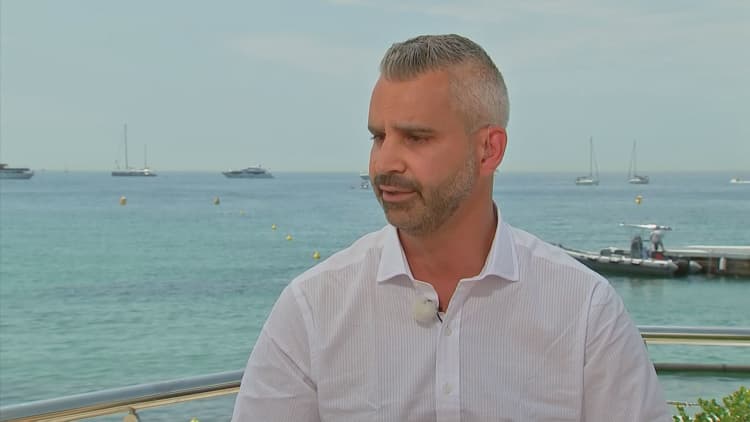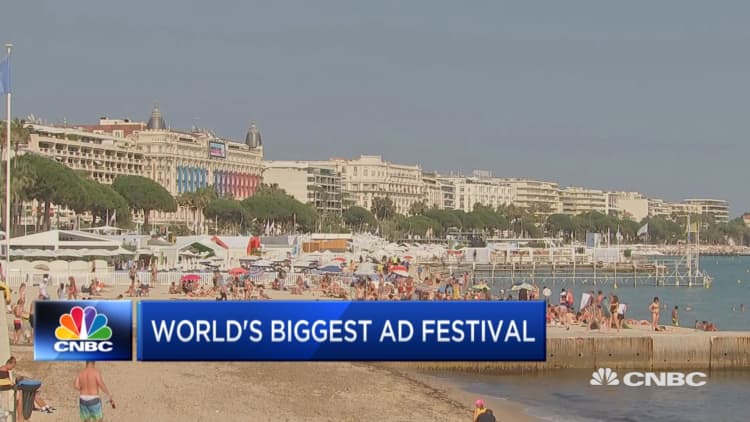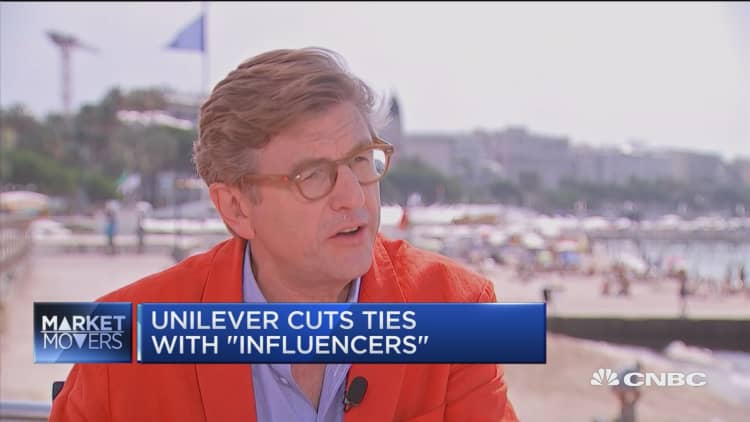Businesses are handling a lot of disruption right now and at the Cannes Lions International Festival of Creativity in France, there was much discussion about how to manage this.
Marketers love to use audience data and artificial intelligence (AI) for better ad targeting, but they also want imaginative ideas for their advertising. This balance between the science and art of marketing was a hot topic at last week’s festival. Consumer trust in business, and the future of the ad agency, were also key trends.
Cannes Lions originated in 1954 after a group of cinema ad operators, inspired by the Cannes Film Festival, decided they wanted to hold their own awards event. Since then, it has become a place where a mix of advertising agencies, tech companies, media owners and brand marketers go to swap ideas, do business and make grand statements on one of the stages at the Palais des Festivals, also the venue for the film festival each May.
Marc Pritchard, chief brand officer at Procter & Gamble, the world’s biggest ad spender, summed up marketers’ concerns at the moment.

“I would say the biggest trend is mass disruption and the need to completely reinvent how we build our brands,” Pritchard said, speaking on a panel hosted by The Economist magazine at the festival.
“What’s happening is traditional media keeps coming down, now even the (TV) networks are cutting back on ads, digital media is still dominant but ad blockers are growing at 30 percent year over year. We had a big wakeup call in the last year around digital transparency; maybe digital media wasn’t all it was cracked up to be.”
“Seventy percent of consumers say ads are annoying and they don’t believe what ads say. Retail is being disrupted by e-commerce, direct to consumer start-ups are attacking every big company as well as retailers,” he added.
“Marketing is being disrupted in a big way… The focus that we have had and the challenge we have had is how to reinvent how we build our brands really, really fast.”
Disruption
As one consultant suggested to CNBC, large companies often buy smaller ones because they are “scared,” and how business operates in an era where disruption is the norm was keenly discussed.
Michael Kassan, chief executive and chair at consultancy MediaLink, told CNBC anchor Karen Tso that 2018 is similar to 1859, when both Charles Darwin’s “The Origin of the Species” and Charles Dickens’ “Tale of Two Cities” were published, the latter with the opening line: “It was the best of times, it was the worst of times.”
“I think that defines our industry, today, for some it’s the best of times, for some it’s the worst of times. … ‘The Origin of the Species’ talked about the survival of the fittest and how only those who can adapt can survive and thrive. I think 1859 feels a little like 2018,” he said.
Wenda Harris Millard, MediaLink’s vice chair, cited smaller companies as more disruptive than larger ones. "I think the real disruptors in many, many ways are… the Dollar Shave Clubs of the world, the Kind Bars, the Red Bulls," .

"Those, to me, are shaking the (marketing) industry to the core. In addition to some of those big, big players, but… they are to be contended with." Unilever bought razor subscription business Dollar Shave Club in a $1 billion deal in 2016, while Mars bought a stake in nut snack bar Kind in November.
In response to the disruption, businesses are looking for cheaper and more efficient ways of working with suppliers, with P&G putting its separate ad agencies under one roof to work on a , which won a Grand Prix — a top accolade — at Cannes. Agencies, in turn, are feeling the heat from consultancies such as Deloitte and Accenture Interactive, both Cannes sponsors.
Creativity vs data
Pritchard drew spontaneous applause from the audience as he described judging ad campaigns against whether they gave him the “tingle factor,” in a world where there is so much analysis and measurement of ads before they go live.
A blend of data and creative thinking is likely to be what helps businesses get ahead: those that do so grow their revenues at 10 percent a year, rate of S&P 500 firms, according to a study by McKinsey released at Cannes.
Ever-more targeted advertising and personalized content are what many brands aim at and this means an increasing focus on data. AT&T’s of Time Warner will only accelerate this, as Kassan told CNBC. “The idea of the advanced advertising platforms and the investments that AT&T… will make, I think will go a long way to driving better contextual and targeted advertising, which I think is a positive for all of us.”
Meanwhile, Chinese e-commerce giant Alibaba had a stand in the Palais promoting its marketing platform Alimama. One of its products, AI Copy, can produce 20,000 versions of an ad per second, based on big data analysis.
Fake followers
At the festival, Unilever announced that it would stop working with social media stars (and can earn thousands of dollars for tweets or posts promoting products), while a report by PR consultancy Edelman showed that four in 10 people have deleted one of their social media accounts .

The social media giants were out in force, with Facebook, Google and Twitter hosting their own , and Google named creative marketer of the year. Facebook’s beach cabana featured iPads where ad executives could check their privacy settings, while Carolyn Everson, its vice president of global marketing solutions, spoke about the steps the network is taking to protect people’s privacy and curb the spread of fake news, and about how the company wants technology to be a force for good.
Stamping out sexism
The world’s biggest advertisers, with ad budgets running into the billions of dollars, also use Cannes as a place to promote their moral credentials. While they use the World Economic Forum event in Davos to talk about ethics and economics (and several CMOs this year), Cannes is a place where they can show what they are doing to stamp out sexism in advertising, for example.
At Cannes in 2017, a group of businesses launched an initiative to remove stereotypes in advertising, and this year saw companies show what they are doing.
P&G announced a to push gender equality and is set to sponsor the first “She is equal” summit in New York in September, while HP Chief Marketing Officer Antonio Lucio has been pushing his ad agencies to include a more diverse mix of people to work on his advertising.

